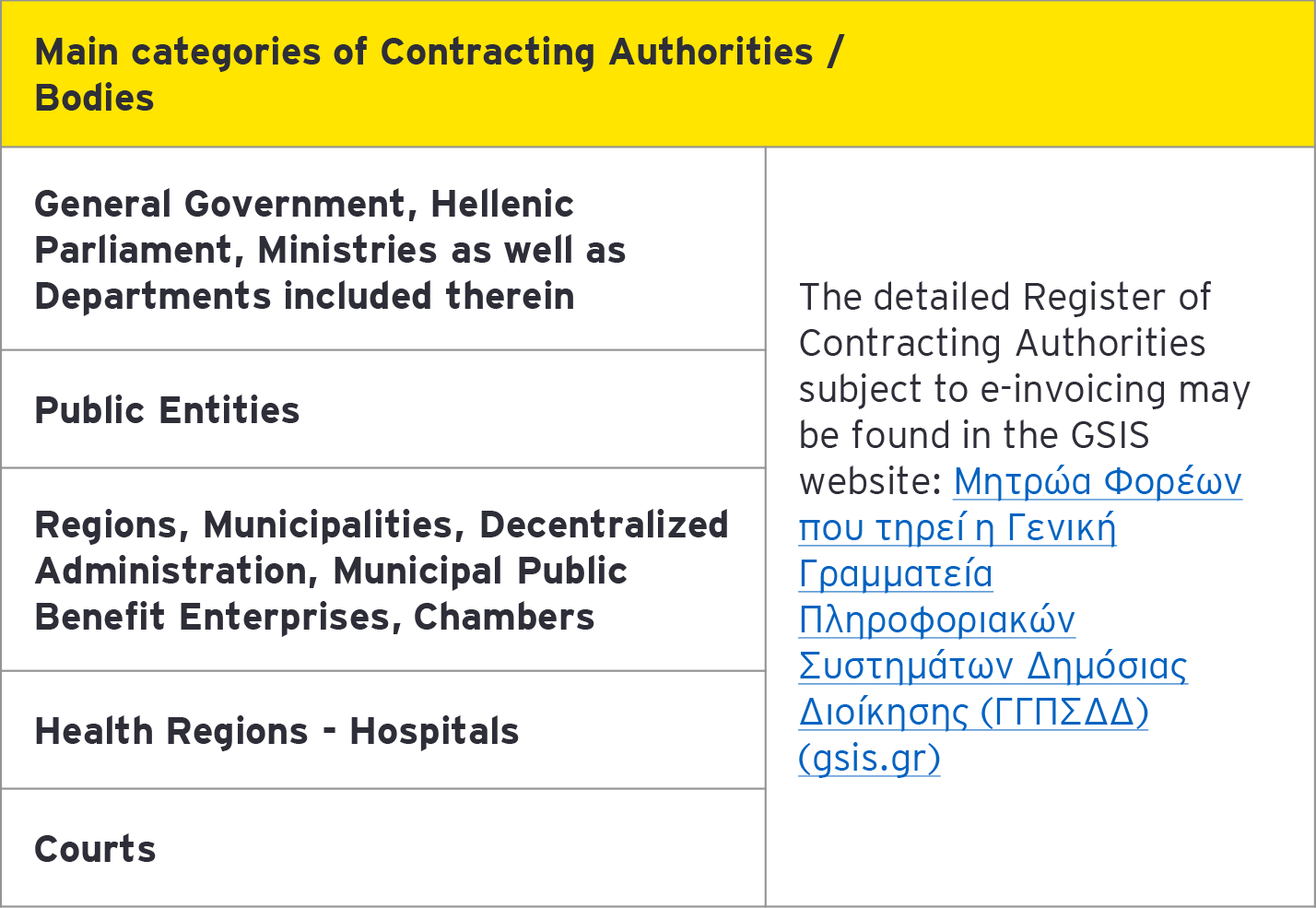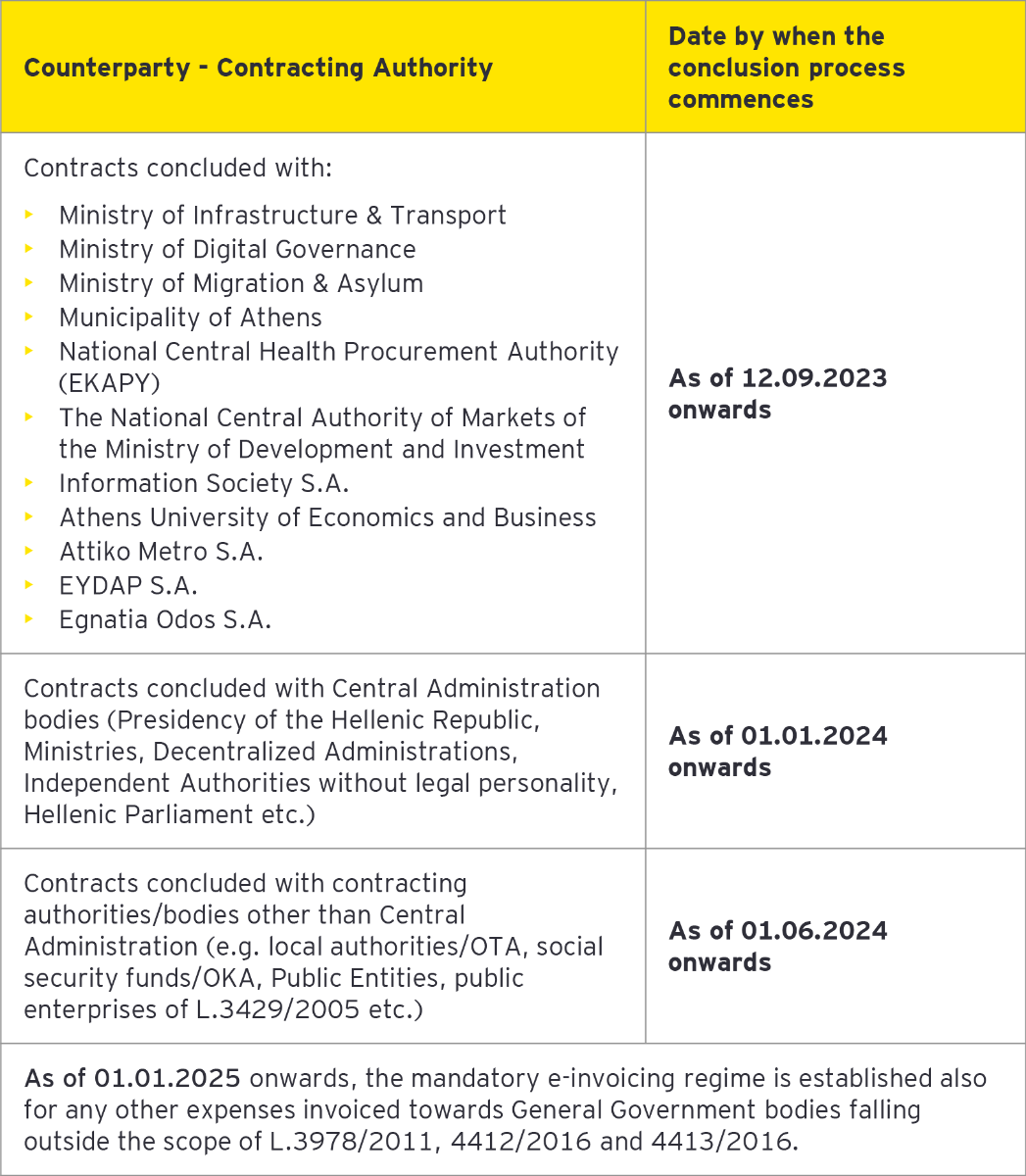EY refers to the global organization, and may refer to one or more, of the member firms of Ernst & Young Global Limited, each of which is a separate legal entity. Ernst & Young Global Limited, a UK company limited by guarantee, does not provide services to clients.

In the context of implementing the articles 148-154 of Law 4601/2019, the Joint Ministerial Decision no. 52445 ΕΞ 2023 was issued in order to determine the obligations in relation to e-invoices’ issuance in the context of Public Procurement Contracts (B2G transactions) in accordance with the European Standard, whereas further clarifications were provided by the Ministerial Decision no 78366 ΕΞ 2023.
- The general rule refers to the mandatory e-invoicing in the frame of contracts between economic bodies and the Public Sector, provided that the procedure for their conclusion commences as of 12 September 2023 onwards.
- A gradual integration of economic bodies in the mandatory e-invoicing regime is provided, depending on the counterparty/contracting authority and the legal framework governing the relevant contracts.
- Criterion for applying the mandatory e-invoicing is the date by when the process of the contract’s conclusion commences, and not the date of the relevant invoice issuance.
- E-invoicing on B2G transactions may be performed only through a Certified e-Invoicing Service Provider.
- In case that mandatory e-invoicing applies for B2G transactions, it seems that the same obligation arises for the issuance and transmission to myDATA platform of any other invoices (B2B transactions) in the same way i.e. through a Certified e-Invoicing Service Provider.
Α. Basic legislative framework on e-invoicing on B2G transactions
Articles 158-160 of L.4972/2022 amended the provisions of articles 148-154 of Law 4601/2019 relating to the harmonization of the Greek legislative framework with the Directive 2014/55/EU on e-invoicing in Public Procurement Contracts.
By virtue of the above provisions:
- The obligation of contracting authorities and contracting bodies was extended to receive and process e-invoices issued in the context of Public Procurement Contracts of L.3978/2011, L.4412/2016, and L.4413/2016 regardless of their estimated value,
- An obligation was introduced for the economic bodies to submit e-invoices in the context of Public Procurement Contracts of the above laws,
- The obligation for e-invoicing was extended also for expenses not incurred in the frame of the abovementioned legal framework.
The obligation of the economic bodies for e-invoicing applies to:
- Contracts concluded in the sectors of defense and security, in accordance with L.3978/2011,
- Public procurement contracts and contracts relating to works, designs, technical and other related scientific services as well as supplies and general services, in accordance with L.4412/2016,
- Concession agreements, in accordance with L.4413/2016, as well as
- Any expense category incurred by contracting authorities or bodies.
Β. Contracting Authorities / Bodies (indicative reference) and Economic Bodies

“Economic body’ means any individual or legal person or public body or group of such persons and/or bodies, including any temporary association of undertakings, which offers the execution of works and/or a work, the supply of products or the provision of services to the market.
C. Developments in relation to the mandatory implementation of e-invoicing on B2G transactions
- As a general rule, the time point for the commencement of the mandatory regime of e-invoicing appears to be the date by when the process for the conclusion of the relevant contract commences (said time point is determined on a case-by-case basis by the provisions of L. 3978/2011, 4412/2016 and 4413/2016) and not the date of issuance of the invoice.
- A gradual inclusion to the mandatory e-invoicing regime is provided depending on the body to which the contracting authorities belong as well as the legal framework governing the relevant expenses, starting from 12 September 2023.
- An explicit provision referring to the economic body’s obligation for issuance of e-invoices, should be included in the relevant contract.
There is no obligation for e-invoicing for:
- Public contracts of minor value, i.e. value equal to or less than €2.500 excluding VAT.
- Public contracts concluded between entities of the Public Sector, when these entities are acting in a non-competitive manner and outside of any procedure addressed to the market (i.e. when they are not acting as economic bodies).
- Other General Government expenditure up to €2.500, which do not fall within the scope of L.3978/2011, L.4412/2016 and L.4413/2016.
- Contracts that fall within the scope of L.3978/2011 (procurements related to Defense and Security) and are classified as secret.
The table below summarizes indicatively the categories of Public Contracts, which gradually fall within the scope of the e-invoicing regime:

D. Issuance of e-invoices on B2G transactions via Certified e-Invoicing Service Providers
- E-invoicing on B2G transactions may be performed only through a Certified e-Invoicing Service Provider, for whom additional requirements apply with regards to its license certification.
- To be noted that insofar the mandatory e-invoicing is applied on B2G transactions, it appears that a cumulative obligation arises for the issuance as well as for transmission to myDATA platform of any other invoices (B2B transactions) in the same manner i.e. through a Certified e-Invoicing Service Provider (Decision 1138/2020).
The mandatory e-invoicing for B2G transactions through Certified e-Invoicing Service Providers as well as its emerging extension to B2B transactions, creates the below issues for the economic bodies/enterprises:
- They should consider whether their transactions with public sector bodies create an obligation for e-invoicing and the date by when this obligation arises.
- In case where the mandatory e-invoicing regime applies on their B2G transactions, said obligation seems to be extended also to their other B2B transactions.
- They should look for an e-invoicing Service Provider which is certified for B2G transactions.
- If they have already implemented e-invoicing for their B2B transactions, they should consider whether their e-Invoicing Service Provider is also certified for the issuance of invoices for B2G transactions.
- The e-Invoicing Service Provider should be connected to the existing ERP system of the enterprise; thus, appropriate configurations shall be made.
It should be taken into account that, as of 1/1/2024 onwards, all tax documents relating to B2B transactions will be transmitted to myDATA platform at the same time with their issuance (real-time).



